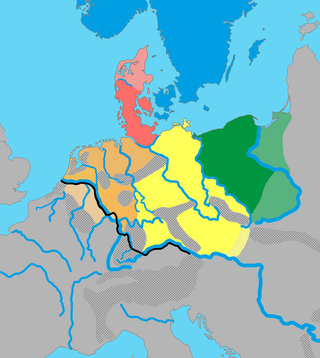Related Research Articles

The Lemovii were a Germanic tribe, only once named by Tacitus in the late 1st century. He noted that they lived near the Rugii and Goths and that they had short swords and round shields.
The Lentienses were a 4th-century Germanic tribe associated with the Alemanni, in the region between the river Danube in the North, the river Iller in the East, and Lake Constance in the South, in what is now southern Germany. They were reported to be one of the most rebellious tribes at the time. There are only two mentions of the Lentienses, both by the Roman historian Ammianus Marcellinus (330–395).

Wolfdietrich is the eponymous protagonist of the Middle High German heroic epic Wolfdietrich. First written down in strophic form in around 1230 by an anonymous author, it survives in four main versions, widely differing in scope and content, and largely independent of each other.
Germanische Altertumskunde Online, formerly called Reallexikon der Germanischen Altertumskunde, is a German encyclopedia of the study of Germanic history and cultures, as well as the cultures that were in close contact with them.
Macrian or Makrian was the king of the Bucinobantes, an Alemannic tribe, in the late fourth century and the brother of Hariobaudes. Macrian tried to confederate all the north Germanic and Alemannic tribes together against Rome.

Weser-Rhine Germanic is a proposed group of prehistoric West Germanic dialects which would have been both directly ancestral to Dutch, as well as being a notable substratum influencing West Central German dialects. The term was introduced by the German linguist Friedrich Maurer as a replacement for the older term Istvaeonic, with which it is essentially synonymous. The term Rhine-Weser-Germanic is sometimes preferred.
The Rugini were a tribe in Pomerania. They were only mentioned once, in a list of yet to be converted tribes drawn up by the English monk Bede in his Historia ecclesiastica of the early 8th century:
Sunt autem Fresones, Rugini, Danai, Hunni, Antiqui Saxones, Boructuari; sunt alii perplures hisdem in partibus populi paganis adhuc ritibus servientis.
Vestralpus was an Alemannic petty king of the Bucinobantes in the 4th century AD. The Roman historian Ammianus Marcellinus reports that Julian crossed the Rhine at Mainz in 359 and concluded peace treaties with the Alemannic kings Vestralpus, Macrian, Hariobaudes, Urius, Ursicinus and Vadomarius after they had returned all Roman prisoners.
The Lautertal Limes is a Roman limes section of the early 2nd century which is located between the River Neckar and the Swabian Jura. It extends for a distance of 23 kilometres (14 mi), running, straight as a die, from the present-day municipality of Köngen on the Neckar in the northwest to Donnstetten in the Swabian Jura to the southeast.
Hariobaudes was an Alemannic petty king in the 4th century AD. The Roman writer Ammianus Marcellinus reports that Julian crossed the Rhine at Mainz in 359 and concluded a peace treaty with the Alemannic kings Hariobaud, Macrian, Urius, Ursicinus, Vadomarius and Vestralpus after they agreed to return all prisoners.
Urius was an Alemannic petty king in the 4th century AD. The Roman writer Ammianus Marcellinus reports that Julian crossed the Rhine at Mainz in 359 and concluded a peace treaty with the Alemannic kings Urius, Hariobaudes, Macrian, Vadomarius, Ursicinus and Vestralpus.
Hortarius was an Alemannic king in the 4th century.
Agenaric, also called Serapio, was an Alemannic prince in the 4th century. Agenaric was the son of petty king Mederic and the nephew of another petty king, Chnodomarius. In 357, together with his uncle, Agenaric commanded the Alemannic army at the Battle of Strasbourg, in which the Alemanni were defeated by Julian.
Gundomad or Gundomar, was an Alemannic petty king in the area around Breisgau, Germany in the 4th century. The Roman historian Ammianus Marcellinus reports that Gundomad, together with his brother Vadomarius, in 354 concluded a peace treaty at Augst after having been defeated in battle by emperor Constantius II. In 357, Gundomad was killed by his own people for having been to loyal to the Romans. They then made an uprising against emperor Julian.
Mederic was an Alemannic petty king. His brother Chnodomarius was the petty king of another district. Mederic spent much time in Gaul, where he was introduced to ancient Greek culture. Because of this influence, Mederic gave his son Agenaric the name Serapio, after the Graeco-Egyptian god Serapis.
Suomarius was an Alemannic petty king in the 4th century.
Vithicabius was an Alemannic petty king from 360 to 368. He was a son of Vadomarius, and succeeded his father as king after the latter had been banished to Hispania by emperor Julian. He had grown up in Roman custody. Ammianus Marcellinus describes Vithicabius as a physically weak, but a brave and aggressive leader. Although having promised Julian to maintain peace, Vithicabius continued raiding Roman territory. He was assassinated in 368 under Valentinian I by a bribed servant, but the Alemannic raids on Roman territory continued nevertheless.

Dieter Geuenich is a German historian who specializes in the history of Germanic peoples.

Franz Rolf Schröder, often referred to as F. R. Schröder, was a German philologist who was Professor and Chair of German Philology at the University of Würzburg. He specialized in the study German and early Germanic literature, and Germanic and Indo-European religion. He was for many decades editor of the Germanisch-Romanische Monatsschrift.

Dieter Bernhard Herrmann was a German historian of astronomy and author of numerous popular science books on astronomy. He was director of the Zeiss Major Planetarium in Berlin from 1987 to 2004. In his scientific work he dealt with the early development of astrophysics and the application of quantitative methods in the history of science.
References
- ↑ Hussey, Joan Mervyn (1957). The Cambridge Medieval History. CUP Archive. pp. 252–253. Retrieved 21 August 2018.